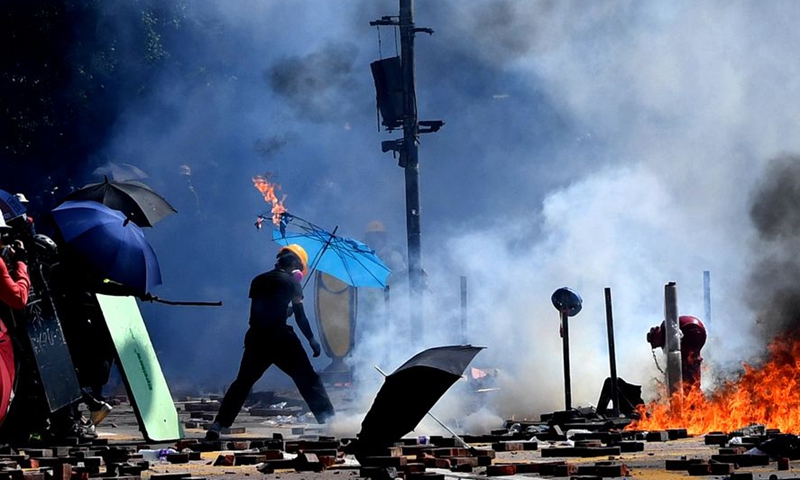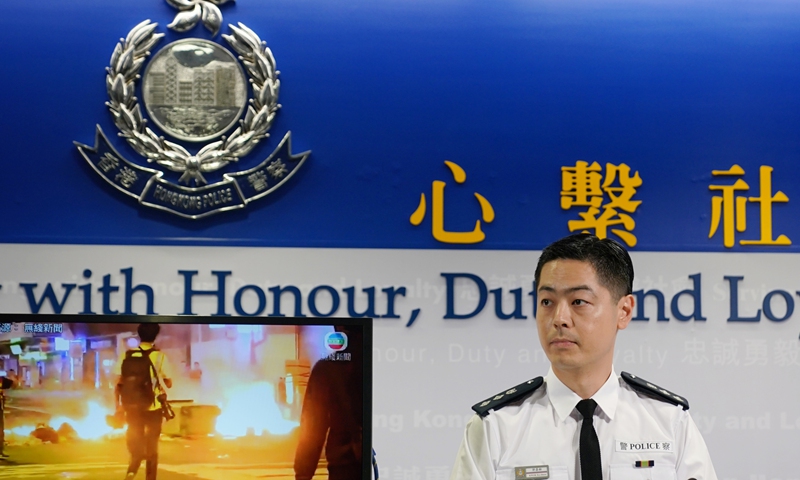Central govt to handle special natl security cases while HKSAR to deal with 'normal' ones, showing clear division of authority under draft
By GT staff reporters Source:Global Times Published: 2020/6/20 23:50:13

A rioter sets fire and destroys public facilities outside the Hong Kong Polytechnic University in south China's Hong Kong, Nov. 17, 2019. Photo:Xinhua
China's central government assumes fundamental responsibilities for the national security affairs in the Hong Kong Special Administrative Region (HKSAR) while the SAR has constitutional responsibilities and should perform its duties, according to the newly unveiled draft of the national security law for Hong Kong, which also clearly stipulates case jurisdiction, law application and related procedures.
The HKSAR shall exercise jurisdiction over criminal cases endangering national security from investigation, prosecution to trial and punishment, unless in special circumstances, according to the provisions of the draft law released after the three-day meeting of the 19th session of the 13th National People's Congress (NPC) Standing Committee which concluded on Saturday.
All these procedures would be carried out under the legal system of the HKSAR, in line with local laws and the national security law for Hong Kong, the draft said.
From the aspect of law enforcement, when the Hong Kong Police Force (HKPF) is handling cases which endanger national security, it could adopt various means empowered by the existing law in Hong Kong as well as provisions of the national security law for Hong Kong, the draft showed.
The chief executive of the HKSAR government shall appoint a number of judges from current or qualified former magistrates, district court judges, judges of the Court of First Instance of the High Court, judges of the Court of Appeal, and judges of the Court of Final Appeal. The judges are responsible for handling crimes that endanger national security.
Under the draft law, the HKSAR government will set up a special commission chaired by the chief executive to protect national security.
The provision has copied the successful experience in Macao for safeguarding national security under the "one country two systems" framework, said Li Xiaobing, a Hong Kong affairs expert at Nankai University in Tianjin.
On the decision to allow the chief executive to appoint judges to handle national security cases, Lawrence Tang Fei, a member of the Chinese Association of Hong Kong and Macao Studies, said that the move does not mean the central government lacks trust in the chief justice of the Hong Kong Court of Final Appeal but it is a legally and politically reasonable move to make the chief executive take responsibility for national security matters under the basic law.
"If it was not the chief executive but judges of the Court of Final Appeal to designate judges, it would be unclear who assumes the chief responsibility for maintaining national security in Hong Kong," Tang told the Global Times on Saturday, adding that the move which does not exclude foreign judges is a "scientific, rational and fact-based" decision because there is no evidence that foreign judges have "loyalty issues."
By authorizing the chief executive to appoint the judges, it will allow the chief executive to have more authority while his/her responsibility will be heavier, more significant and play a more important constitutional role, Li told the Global Times on Saturday.
The draft law also stipulates that the commissioner's office for national security affairs in Hong Kong and relevant national authorities exercise jurisdiction over a very small number of crimes against national security under special circumstances.
The proposal to set up a commissioner's office of the central government for national security affairs in Hong Kong is not a move that will undermine the "one country, two systems" but is a sound one that will address problems such as riots which pose serious threats to national security and some opposition groups challenging the supervision power of the central government's liaison office in Hong Kong.

Chief Superintendent Kwok Ka-chuen of Police Public Relations Branch shows photo of fire set by rioters at a press briefing in south China's Hong Kong, Dec. 2, 2019. File photo:Xinhua
The new central government agency will not interfere with HKPF operations, as there will be a clear division of rank and work, where the commissioner's office will handle complex national security cases which are not able to be handled by the police force, observers said.
The office's relationship with the Hong Kong police is akin to that of the US Federal Bureau of Investigation with local police and that of the UK's MI5 Security Service with local police, according to Tang.
"That shows that the central government has considered international examples rather than simply bringing the mainland's national security system to Hong Kong. It highlights the advantage of the 'one country, two system,'" Tang said.
The upcoming national security law for Hong Kong is conducive to safeguarding national security in the HKSAR, avoiding the possibility of leading to a state of emergency in the HKSAR.
Tian Feilong, a Hong Kong affairs and legal expert at Beihang University in Beijing, told the Global Times that the draft law showed that it will thoroughly activate and use the existing forces within the HKSAR government to execute law-enforcement missions regarding national security affairs and will highly respect the human rights and legal standards that already exist in Hong Kong.
"It also covered and considered the uniqueness of national security cases, so that the central government will establish an agency in Hong Kong to ensure the jurisdictional power of the central government in special situations," he said.
On one hand, this could meet the demand of the country to safeguard national security; on the other, the central government has tried its best to maintain the high-level autonomy and judicial independence of the HKSAR, Tian noted, in other words, this would make the new law have a "minimum impact on the one country and two systems but maximize the effectiveness" to safeguard national security.
Posted in: HK/MACAO/TAIWAN